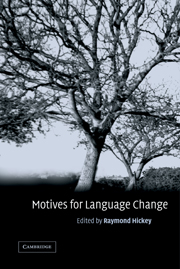Book contents
- Frontmatter
- Contents
- Notes on the contributors
- Acknowledgements
- Introduction
- Part I The phenomenon of language change
- Part II Linguistic models and language change
- Part III Grammaticalisation
- Part IV The social context for language change
- Part V Contact-based explanations
- 10 The quest for the most ‘parsimonious’ explanations: endogeny vs. contact revisited
- 11 Diagnosing prehistoric language contact
- 12 The ingenerate motivation of sound change
- 13 How do dialects get the features they have? On the process of new dialect formation
- Part VI The typological perspective
- Index
- References
13 - How do dialects get the features they have? On the process of new dialect formation
Published online by Cambridge University Press: 22 September 2009
- Frontmatter
- Contents
- Notes on the contributors
- Acknowledgements
- Introduction
- Part I The phenomenon of language change
- Part II Linguistic models and language change
- Part III Grammaticalisation
- Part IV The social context for language change
- Part V Contact-based explanations
- 10 The quest for the most ‘parsimonious’ explanations: endogeny vs. contact revisited
- 11 Diagnosing prehistoric language contact
- 12 The ingenerate motivation of sound change
- 13 How do dialects get the features they have? On the process of new dialect formation
- Part VI The typological perspective
- Index
- References
Summary
Introduction
The concern of the present chapter is to look at a particular type of situation found historically in the anglophone world outside England and to consider the forces which have been instrumental in determining what features the varieties at this location evince. The location in question is New Zealand for what can be termed a new dialect formation scenario (Trudgill et al. 2000a).
The present chapter is intended to make explicit the assumptions which lie behind the discussion of new dialect formation and so hopefully clarify the many issues of theoretical importance raised by the recent innovative work on this process by Elizabeth Gordon, Peter Trudgill and their associates. Before beginning, it is important to stress that the examination of this scenario rests on a significant premise, necessary for the discussion to be found below: speakers are unconsciously aware of features in their own variety and those which they are continually in contact with. If this premise is not accepted in principle then the arguments below will be vacuous. With regard to new dialect formation, I am in broad agreement with the statement by Trudgill et al. that ‘we conclude that the shape of New Zealand English, a fascinating laboratory for the study of linguistic change, can be accounted for in terms of the mixing together of different dialects of English from the British Isles’ (Trudgill et al. 2000a: 316).
Information
- Type
- Chapter
- Information
- Motives for Language Change , pp. 213 - 240Publisher: Cambridge University PressPrint publication year: 2003
References
Accessibility standard: Unknown
Why this information is here
This section outlines the accessibility features of this content - including support for screen readers, full keyboard navigation and high-contrast display options. This may not be relevant for you.Accessibility Information
- 43
- Cited by
